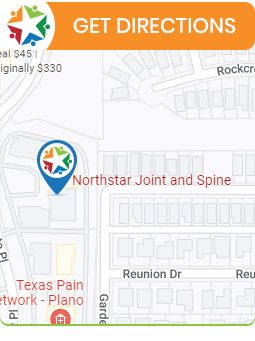Understanding Joint Pain: Causes and Symptoms
At Northstar Joint and Spine, Dr. Robert Nocerini, MD, specializes in treating joint pain caused by conditions such as arthritis, or overuse. With a focus on identifying the root cause of pain, our team develops personalized treatment plans to reduce discomfort, restore function, and help patients regain mobility. Our approach is aimed at improving quality of life and enhancing overall joint health for long-term relief. For more information, contact us today or book an appointment online. We are conveniently located at 7704 San Jacinto Pl Suite #200 Plano, TX 75024.




Table of Contents:
What is joint pain?
What causes joint pain?
What other symptoms might occur with joint pain?
How can a joint specialist help me?
Understanding Joint Pain with Dr. Robert J. Nocerini, MD at Northstar Joint and Spine — Plano, TX
Suffering from joint pain is a very common experience, especially in athletes, the elderly, or those who work in manual labor jobs. While many people are able to attain pain relief through ice packs and over-the-counter medications, there are many causes of joint pain that will require treatment from a joint specialist to ensure that the condition does not worsen and that further damage and pain are avoided.
Joint pain includes any sort of discomfort or pain that is experienced in the joints, regardless of the cause, and is often associated with inflammation, swelling, and stiffness in the affected joint that makes maneuvering as per usual difficult. It is common to experience a limited range of motion when suffering from joint pain as the discomfort and stiffness can make bigger movements very difficult. Sensations often associated with joint pain include feeling achy, sore, or stiff in the joint, and has also been described as providing a burning, throbbing, or even a sensation of “grating”. It is common for joint pain to be more prevalent first thing after waking up but to diminish a bit with movement and activity, however, there are some conditions that cause joint pain that can worsen and increase the pain experienced due to overuse and excess activity.
Joint pain can be caused by a number of different health conditions, ranging from aches and pains experienced after contracting the flu, to a degenerative disease such as arthritis. Developing joint pain becomes more of a potential risk as we age, with many joint issues arising from the overuse of a joint or an increased susceptibility to falling. The most common cause of joint pain is osteoarthritis, which is an autoimmune disease that causes the cartilage between bones to wear down, affecting almost any joint in the body but is most frequently seen in the knees, hips, and hands. Other more common health conditions that often lead to joint pain include:
• Bursitis
• Rheumatoid arthritis
• Gout
• Lupus
• Lyme Disease
• Tendinitis
• Fibromyalgia
Other symptoms that often occur alongside joint pain can vary depending on the actual cause of the pain, with inflammation and swelling being very common associated symptoms. Joint pain can lead to discomfort or difficulty moving around due to stiffness or loss of mobility in the affected joint, often leading to patients struggling with performing normal daily tasks. Other common symptoms that are often associated with joint pain include noises while moving the joint such as grinding, clicking, or snapping. Some patients will also notice sensations such as numbness or tingling in the arms, hands, or legs, and feet, depending on the location of the joint pain. The joint that is affected may also appear to be red and swollen, but this is often indicative of a more serious condition that should be examined by a joint specialist promptly to ensure that there is no infection that is present.
A joint specialist will have the qualifications and experience to efficiently provide relief for joint pain as well as treat the cause of the pain to prevent flare-ups in the future. There are quite a few popular at-home remedies for mild joint pain, but in many cases, joint pain will only keep returning and worsening without proper treatment. The majority of treatment provided by a joint specialist will be to provide pain relief as well as improve the overall function of the joint. Treatment may include steroid injections into the joint, pain medications, and exercises to improve the strength and flexibility of the joint to prevent further damage or pain from occurring down the road. Leaving joint pain untreated can lead to further damage to the joints, or to the surrounding body parts as the rest of your body attempts to compensate for the affected joint, leading to those surrounding muscles and joints often suffering from overuse or improper use. A joint specialist will work with you to determine a treatment plan that provides pain relief as well as works to fix the cause of the problem to allow you to live as comfortably and healthily as possible.
Joint pain can result from structural changes, repetitive strain, or degenerative conditions, and Dr. Robert J. Nocerini, MD helps Plano patients understand each contributing factor. At Northstar Joint and Spine, he combines modern diagnostics with decades of experience to pinpoint the cause of discomfort.
He believes that knowledge empowers patients to make informed decisions about their health. Through education and guided treatment, Dr. Nocerini promotes improved joint strength, comfort, and flexibility tailored to each individual’s needs. For more information, contact us today or book an appointment online. We are conveniently located at 7704 San Jacinto Pl Suite #200 Plano, TX 75024. We serve patients from Plano TX, Willow Bend TX, Frisco TX, Allen TX, Addison TX, North Dallas TX, and surrounding areas.

Check Out Our 5 Star Reviews


Additional Services You May Need
▸ Back Pain
▸ Shoulder Pain
▸ Chronic Pain
▸ Epidural Steroid Injections
▸ Spinal Cord Stimulation
▸ Viscosupplementation
▸ Genicular Nerve Blocks
▸ Facet Injections
▸ Joint Injections
▸ Sacroiliac Joint Injections
▸ Lumbar and Cervical
▸ Facet Medial Branch Blocks
▸ Diagnostic Nerve Blocks
▸ Medication Management
▸ Neck Pain Doctor
▸ Diabetic Peripheral Neuropathy
▸ Headaches
▸ Suboxone
▸ Botox for Migraines
▸ Peripheral Nerve Stimulation
▸ Spine
▸ Joints
▸ Muscles
▸ Bones

Additional Services You May Need
▸ Back Pain
▸ Shoulder Pain
▸ Chronic Pain
▸ Epidural Steroid Injections
▸ Spinal Cord Stimulation
▸ Viscosupplementation
▸ Genicular Nerve Blocks
▸ Facet Injections
▸ Joint Injections
▸ Sacroiliac Joint Injections
▸ Lumbar and Cervical
▸ Facet Medial Branch Blocks
▸ Diagnostic Nerve Blocks
▸ Medication Management
▸ Neck Pain Doctor
▸ Diabetic Peripheral Neuropathy
▸ Headaches
▸ Suboxone
▸ Botox for Migraines
▸ Peripheral Nerve Stimulation
▸ Spine
▸ Joints
▸ Muscles
▸ Bones






